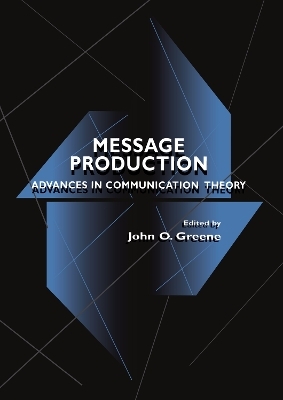
Message Production
Routledge (Verlag)
978-0-8058-2323-3 (ISBN)
The last two decades have seen the development of a number of models that have proven particularly important in advancing understanding of message-production processes. Now it appears that a "second generation" of theories is emerging, one that reflects considerable conceptual advances over earlier models. Message Production: Advances in Communication Theory focuses on these new developments in theoretical approaches to verbal and nonverbal message production. The chapters reflect a number of characteristics and trends resident in these theories including:
* the nature and source of interaction goals;
* the impact of physiological factors on message behavior;
* the prominence accorded conceptions of goals and planning;
* attempts to apply models of intra-individual processes in illuminating inter-individual phenomena;
* treatments which involve hybrid intentional/design-stance approaches; and
* efforts to incorporate physiological constructs and to meld them with psychological and social terms.
The processes underlying the production of verbal and nonverbal behaviors are exceedingly complex, so much so that they resist the development of unified explanatory schemes. The alternative is the mosaic of emerging theories such as are represented in this book -- each approach according prominence to certain message-production phenomena while obscuring others, and providing a window on some portion of the processes that give rise to those phenomena while remaining mute about other processes. The amalgam of these disparate treatments, then, becomes the most intellectually compelling characterization of message-production processes.
John O. Greene
Contents: G.G. Sparks, Foreword. Part I:Theories of Message Production: Historical Context, Future Prospects.J.O. Greene, Introduction: Advances in Theories of Message Production. S.R. Wilson, Developing Theories of Message Production: The Next Generation. Part II:Intra-Individual Coherence and Coordination.J.P. Dillard, Explicating the Goal Construct: Tools for Theorists. J.R. Meyer, Cognitive Influences on the Ability to Address Interaction Goals. S.A. McCornack, The Generation of Deceptive Messages: Laying the Groundwork for a Viable Theory of Interpersonal Deception. S. Kemper, M.L. Hummert, New Directions in Research on Aging and Message Production. J.O. Greene, A Second Generation Action Assembly Theory. D. Hample, Framing Message-Production Research with Field Theory. Part III:Inter-Individual Coherence and Coordination.V.R. Waldron, Toward a Theory of Interactive Conversational Planning. C.R. Berger, Producing Messages Under Uncertainty. R.E. Sanders, The Production of Symbolic Objects as Components of Larger Wholes. J.K. Burgoon, C.H. White, Researching Nonverbal Message Production: A View From Interaction Adaptation Theory. R. Buck, From DNA to MTV: The Spontaneous Communication of Emotional Messages.
| Erscheint lt. Verlag | 13.10.1997 |
|---|---|
| Reihe/Serie | Routledge Communication Series |
| Verlagsort | New York |
| Sprache | englisch |
| Maße | 152 x 229 mm |
| Gewicht | 635 g |
| Themenwelt | Geisteswissenschaften ► Philosophie ► Sprachphilosophie |
| Geisteswissenschaften ► Psychologie ► Allgemeine Psychologie | |
| Geisteswissenschaften ► Psychologie ► Verhaltenstherapie | |
| Mathematik / Informatik ► Informatik ► Theorie / Studium | |
| ISBN-10 | 0-8058-2323-9 / 0805823239 |
| ISBN-13 | 978-0-8058-2323-3 / 9780805823233 |
| Zustand | Neuware |
| Haben Sie eine Frage zum Produkt? |
aus dem Bereich


